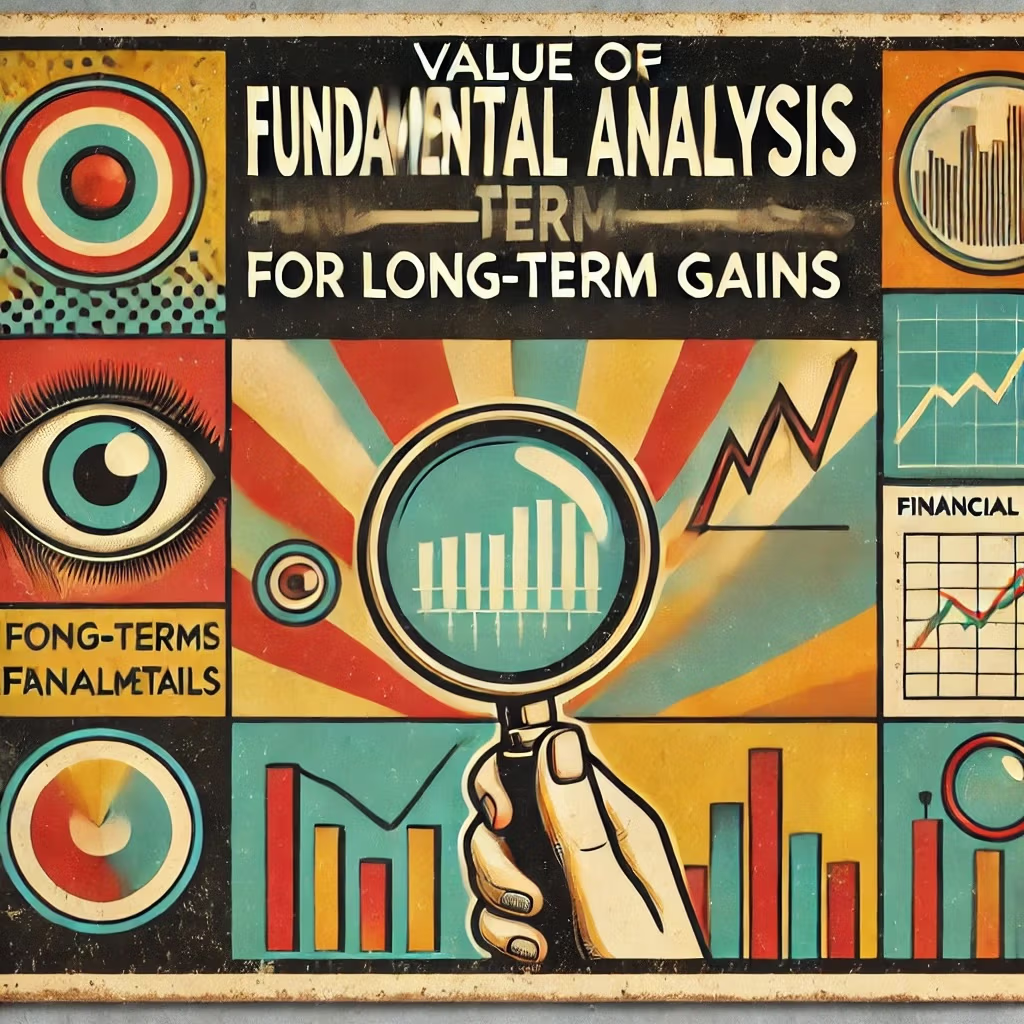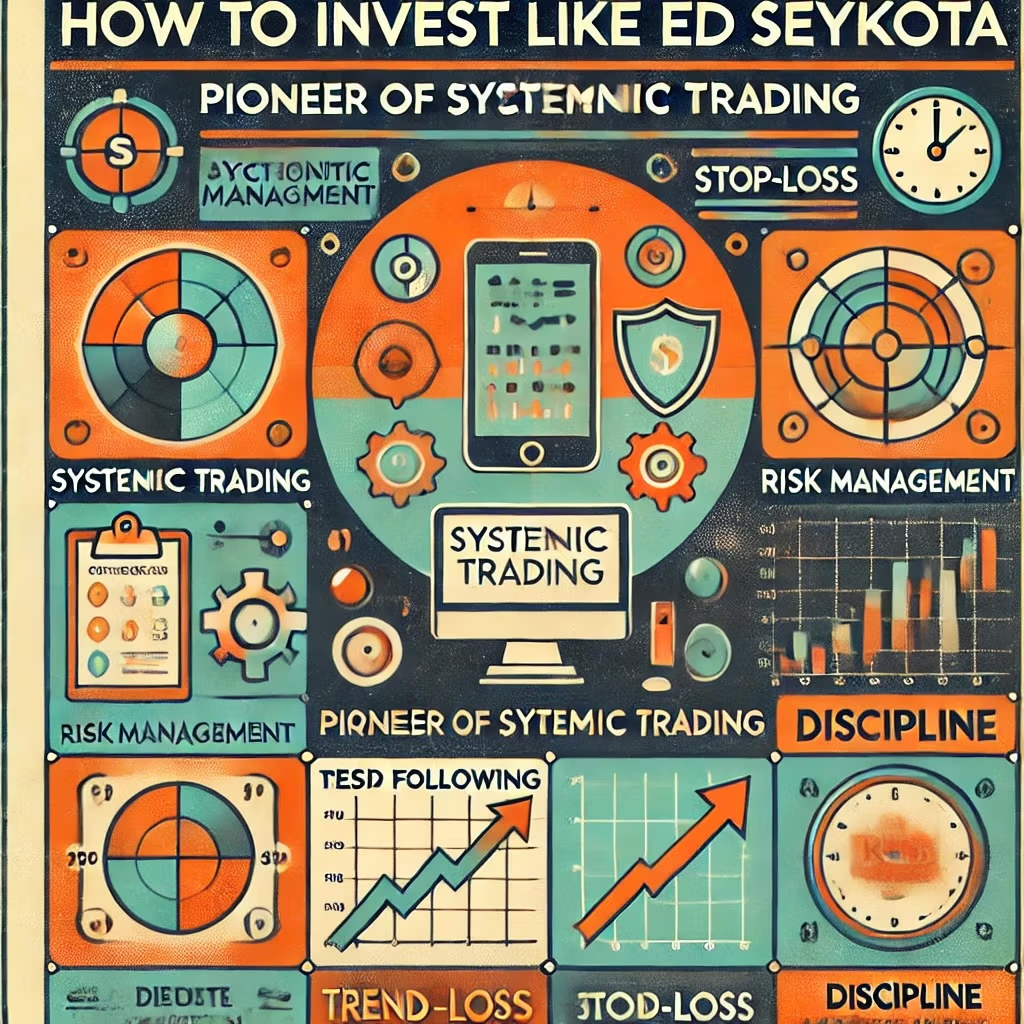
What is the Alpha Mindset?
The alpha mindset represents a blend of qualities that enable investors to think differently. Instead of simply following market trends or relying on traditional metrics, investors with this mindset develop strategies rooted in independent thinking and long-term vision. They’re willing to take calculated risks and aren’t swayed by short-term market noise. Instead, they focus on value and fundamentals, staying committed to their insights even when the market shifts.
This mindset is particularly powerful because it influences three essential elements in investing:
- Decision-Making: With an alpha mindset, investors base decisions on deep research, analysis, and a clear strategy, not on emotions or hype.
- Risk Tolerance: Top investors using this approach are comfortable with higher stakes. They understand risk and reward go hand in hand.
- Adaptability: The market isn’t static, and neither is the alpha mindset. Investors with this perspective constantly adjust and evolve with changing conditions.
Introduction to the Alpha Mindset
We’ll explore how the alpha mindset empowers investors to outperform. We’ll break down each component of this approach, diving into what makes these investors so resilient, strategic, and successful. By understanding their mindset, investors can learn to incorporate these principles into their own practices, potentially enhancing their ability to navigate complex market landscapes.

Why the Alpha Mindset Matters
Investing with an alpha mindset provides several advantages. By thinking independently, investors with this approach are often first to spot new opportunities and trends. This enables them to move quickly when undervalued investments arise, often catching upside potential others may overlook.
Key Takeaways for adopting the alpha mindset:
- Independent Thought: Rather than following popular opinion, top investors rely on their analysis, questioning assumptions, and forming their own views.
- Commitment to Long-Term Success: An alpha mindset focuses on sustained growth, not just short-term gains.
- Dynamic Adaptability: By staying flexible, investors can pivot strategies as new information and market trends emerge.
Building Your Alpha Mindset
For those seeking a way to improve their investing approach, adopting an alpha mindset can be a game-changer. It’s about more than just trying to beat the market; it’s about approaching investments with a new perspective. Here’s how to start developing this mindset:
- Study successful investors who embody this mindset—learn from their wins and losses.
- Practice patience and resilience, focusing on the broader picture rather than quick gains.
- Refine your own decision-making framework by incorporating diverse perspectives and data points.
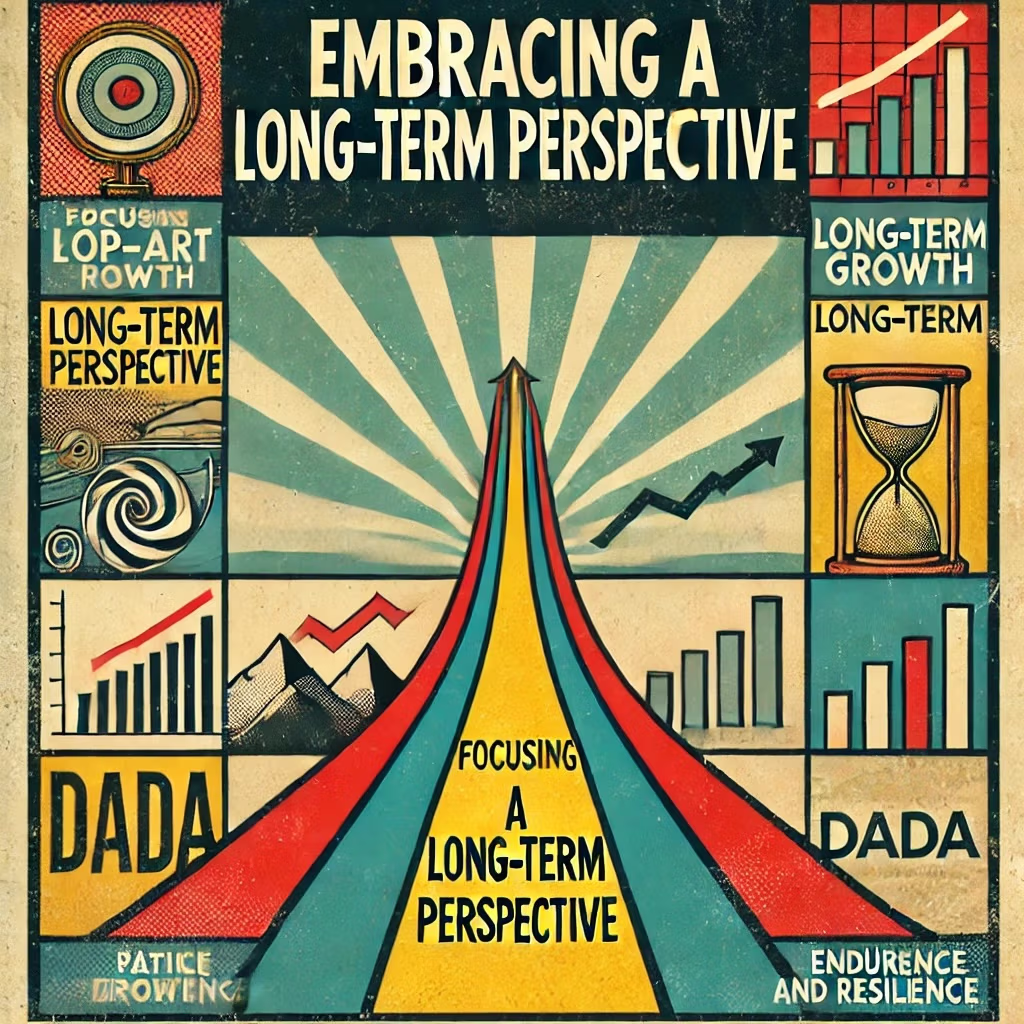
Embracing a Long-Term Perspective
Top investors often set themselves apart by taking the long view. They’re not swayed by the daily ups and downs of the stock market or the noise of short-term news cycles. Instead, they zero in on long-term growth, cultivating patience and discipline in a market environment that often demands quick reactions. This patience is not just a personal trait; it’s an investment strategy that lets them capitalize on compounding returns and survive inevitable market dips.
The Importance of Patience in Investing
One key characteristic of successful investors is their commitment to patience. They recognize that sustainable growth rarely happens overnight. While short-term gains can be tempting, especially in today’s rapid trading environment, these investors focus on building wealth steadily over time. By ignoring short-term noise and maintaining a clear long-term vision, they position themselves to benefit from market growth across economic cycles.
- Enduring Market Fluctuations: When markets turn volatile, many investors feel compelled to act—often irrationally. Those with a long-term perspective, however, understand that these fluctuations are often temporary. Instead of reacting to every market shift, they stay calm and remain invested.
- Compounding Returns: Patience also allows investors to benefit from the power of compound interest. By holding investments for years rather than months, they give their assets time to grow exponentially, reaping rewards that are unattainable through constant trading.
- Avoiding FOMO: With a steady, patient approach, investors avoid the “fear of missing out” (FOMO) that leads to impulsive decisions. Instead, they focus on solid investments they believe in, even if it means holding through tough times.
Tip: Remember that compounding is a powerful ally. Even modest returns, compounded over decades, can lead to significant wealth.
Value of Fundamental Analysis for Long-Term Gains
For those with an alpha mindset, fundamental analysis is crucial. Rather than getting caught up in stock price movements, these investors take the time to understand the core of a company’s business. They dive deep into a company’s financials, business model, and industry position to ensure it’s a strong choice for the future.
Why Fundamental Analysis Matters
Fundamental analysis enables investors to look beyond surface-level trends and truly understand a company’s worth. This approach involves studying a company’s earnings, revenue growth, competitive advantages, and management quality. By focusing on a company’s intrinsic value, investors make better-informed decisions that aren’t swayed by temporary market fluctuations.
- Informed Decision-Making: Investors with a long-term focus make decisions based on solid research, not just short-term predictions. This minimizes reactionary moves and encourages strategic positioning in high-quality stocks.
- Confidence Amidst Market Swings: When you understand a company’s intrinsic value, you’re less likely to be influenced by short-term volatility. Investors who know what they own can remain confident, knowing the fundamentals support their investment.
- Avoiding Market Distractions: There’s always some market news—an earnings miss, a new competitor, or a regulatory concern. Long-term investors don’t get sidetracked by every headline; they stay the course because they’ve built a strong foundational understanding of their investments.
Tip: Fundamental analysis may require effort, but the rewards are substantial. Knowing the value of what you own fosters resilience in unpredictable markets.

High Conviction and Independent Thinking
In the world of investing, the greatest rewards often come to those who dare to think differently. Top investors aren’t afraid to form opinions that go against the grain. They don’t blindly follow market trends or jump on every bandwagon. Instead, they rely on independent thinking, which allows them to spot undervalued opportunities others might overlook. This kind of mindset doesn’t just help them find unique investments; it helps them achieve alpha by recognizing potential where others might see only risk.
Making Decisions Independently of Market Trends
When it comes to investing, herd mentality can be dangerous. Market trends and popular sentiment often influence investors to buy high and sell low—essentially, following the crowd rather than taking a unique stance. Independent thinking frees top investors from this cycle. They develop perspectives based on their own research and analysis rather than letting others’ opinions dictate their moves. This mindset allows them to avoid overhyped stocks and, in many cases, identify hidden gems in the market.
- Finding Value in Unpopular Places: Sometimes, the best opportunities lie where others fear to tread. For example, in times of economic uncertainty, certain stocks may become deeply undervalued. Rather than avoiding these investments, independent thinkers dig deeper, evaluating the true risk versus reward.
- Resisting the Urge to Follow: Not every hot stock tip or trending sector is worth pursuing. Independent investors recognize that just because everyone else is buying doesn’t mean it’s a smart choice. They know that sticking to their analysis often yields better returns.
- Evaluating Long-Term Potential: Independent thinking encourages a focus on long-term growth rather than reacting to short-term price swings. Investors who take this approach avoid getting swayed by market hype, maintaining their commitment to quality investments they believe in.
Tip: To cultivate independent thinking, regularly review your research process and double-check your sources. Avoid relying solely on news headlines or popular market sentiment.
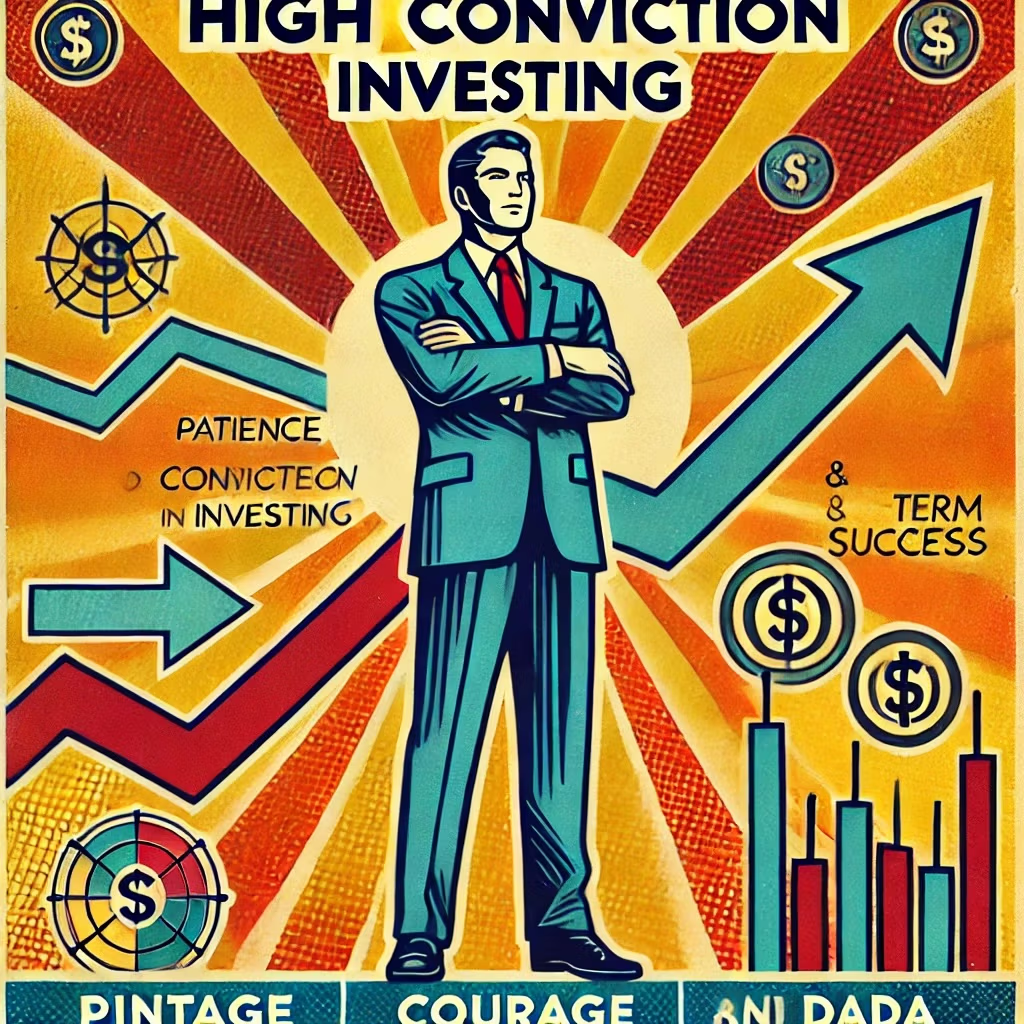
High Conviction Investing
High conviction is another hallmark of the alpha mindset. Investing with conviction means having confidence in your research and standing by it, even if the market says otherwise. Top investors develop strong beliefs in their analysis and are not easily shaken, even when their chosen stocks don’t immediately perform as expected. High conviction requires clarity, courage, and patience—qualities that drive long-term success.
Why High Conviction Matters
Investing with high conviction doesn’t mean ignoring risk. It means being selective and committed, focusing only on investments with substantial upside potential. It’s not about spreading your capital thinly across hundreds of stocks but rather about betting on fewer, well-researched opportunities where you see true value.
- Backing Your Research: When you’ve done your homework, it’s easier to hold your ground. High conviction investors stay focused because they know they’re making informed decisions based on sound analysis.
- Withstanding Market Volatility: High conviction helps investors remain steady during market downturns or turbulence. For example, some of the most successful investors held on to their positions during the 2008 financial crisis, confident that their strategies would pay off in the long run.
- Not Swayed by Short-Term Losses: Many successful investments face short-term challenges. Conviction means looking beyond these temporary setbacks, confident in the eventual payoff.
Example: Warren Buffett’s investment in American Express is an example of high conviction. During the 1960s, American Express faced a major scandal that sent its stock plummeting. Buffett believed in the company’s long-term potential and invested heavily despite public skepticism. In time, the stock rebounded, becoming one of his most profitable investments.

Calculated Risk-Taking and Discipline
Successful investing is as much about understanding and managing risks as it is about seizing opportunities. The “alpha mindset” of top investors is marked by a proactive approach to assessing risk—balancing potential rewards with careful exposure. Rather than shying away from risks entirely, these investors strategically manage them. They know that risk-taking, when done right, is essential to achieving above-average returns.
Understanding and Managing Risk
Investing carries inherent risks, but the alpha mindset transforms these risks into calculated decisions. Top investors look at each investment’s potential for reward while understanding its risks. They conduct in-depth analyses, assessing factors that could impact returns negatively. This includes evaluating economic trends, understanding company-specific risks, and considering sector-wide influences.
- Proactive Risk Assessment: Top investors actively measure the possible downsides of an investment rather than relying solely on potential gains. This proactive approach helps them prepare for both the expected and unexpected, providing a roadmap for navigating volatility.
- Balanced Exposure: A well-balanced portfolio helps mitigate individual risks. Alpha investors spread their exposure by diversifying across asset classes and sectors. This strategy shields them from the adverse effects of any single investment or sector downturn.
- Avoiding Overexposure: High returns are enticing, but putting too much weight on one high-risk opportunity can be a mistake. Alpha investors avoid unnecessary overexposure, ensuring no single position dominates their portfolio’s risk profile.
Tip: Consider evaluating each investment’s impact on your overall portfolio. Before diving into a high-potential stock, assess its alignment with your risk tolerance and your portfolio’s long-term objectives.

Practicing Discipline and Consistency
Discipline is what keeps alpha investors grounded, especially in turbulent markets. Investing is an emotional journey, and during periods of volatility, even seasoned investors can be tempted to make impulsive decisions. Top investors stay disciplined by adhering to a defined strategy, following investment criteria, and remaining focused on long-term goals, even when market conditions become challenging.
The Role of Consistency
Discipline in investing isn’t just about patience; it’s about maintaining consistency in applying proven strategies. Top investors establish investment criteria that guide their decisions, ensuring each investment aligns with their overall strategy. By consistently applying these principles, they maintain objectivity and avoid getting swayed by short-term noise.
- Sticking to Investment Criteria: A disciplined investor sets specific criteria for investments, whether it’s a certain profit margin, growth rate, or industry factor. This approach serves as a checklist, ensuring only sound investments make it into the portfolio.
- Managing Emotional Decisions: Market volatility can lead to emotional responses. However, staying true to a strategy mitigates impulsive choices. Alpha investors stick to their research-backed criteria, trusting their approach during downturns and avoiding panic-driven decisions.
- Long-Term Goals: Discipline keeps investors aligned with their long-term objectives. By focusing on the bigger picture, top investors avoid overreacting to daily market changes, which preserves their strategies’ integrity.
Example: Legendary investor Ray Dalio exemplifies this discipline. His focus on maintaining balance and adhering to core investment principles has allowed him to navigate even the most volatile markets. His approach is a testament to the power of consistency in achieving long-term success.
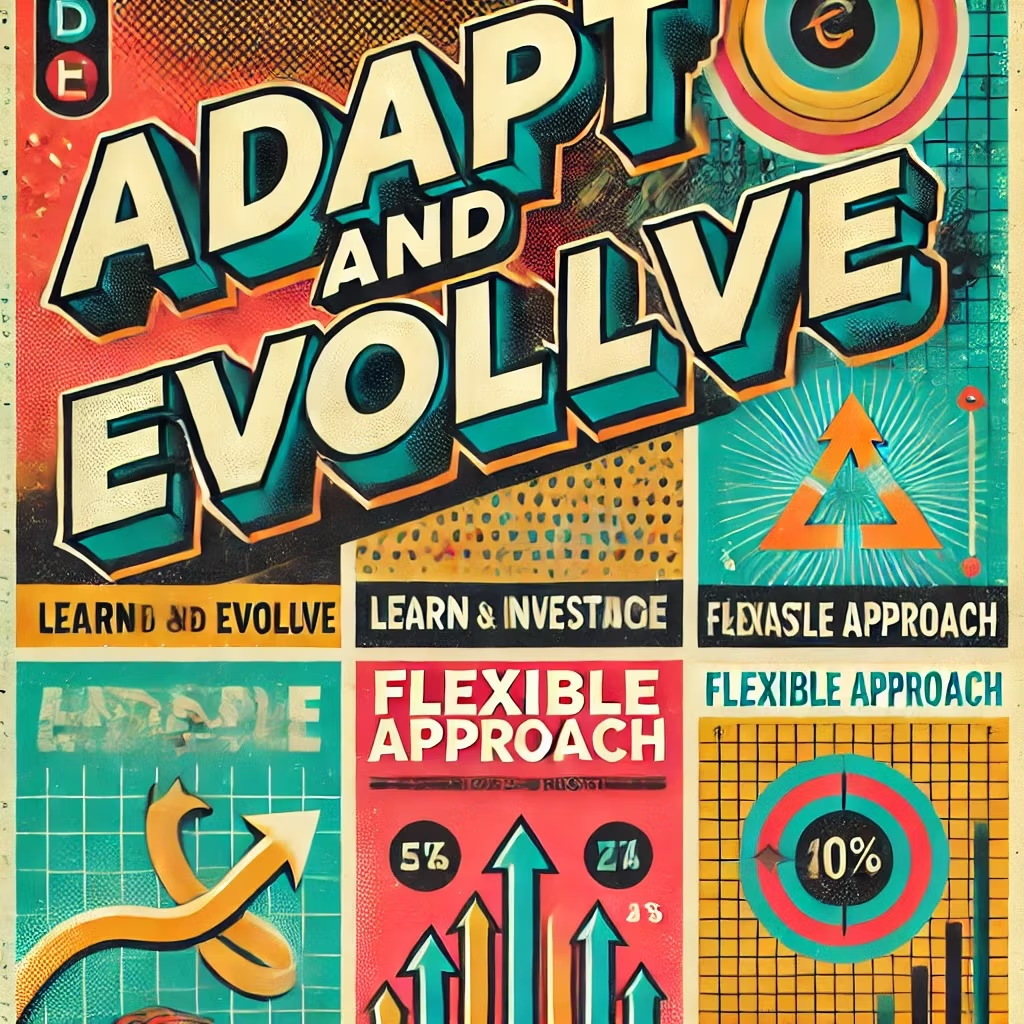
Adaptability and Learning from Mistakes
One hallmark of the alpha mindset is adaptability. Top investors don’t get stuck in rigid strategies; they evolve as the market does. Adapting to changing conditions requires a keen sense of observation and a willingness to adjust plans as necessary. For these investors, remaining flexible isn’t optional—it’s essential.
Adapting to Changing Market Conditions
Markets are dynamic. Trends rise and fall, economic shifts reshape industries, and global events can change everything overnight. Alpha investors know that to succeed, they must stay aware of these changes. They monitor economic indicators, industry developments, and technological advancements that may affect their portfolios. When conditions shift, they’re ready to adjust.
- Strategy Adjustments: Rather than sticking stubbornly to a single approach, top investors modify their strategies as conditions warrant. For instance, they might pivot to more defensive assets during recessions or focus on growth stocks in booming markets.
- Flexible Asset Allocation: Adaptability often means shifting capital among asset classes. If equities are too volatile, they may increase their positions in bonds or commodities, enhancing portfolio stability.
- Continuous Market Monitoring: Staying updated on the latest economic and market developments is crucial. Alpha investors frequently review their portfolios, checking for alignment with current conditions and future potential.
Example: Warren Buffett’s approach highlights adaptability. Although known for his focus on value investing, he has occasionally adjusted his portfolio to include technology stocks like Apple, recognizing shifts in consumer behavior and the tech industry’s influence on the market.
Learning from Past Mistakes
Mistakes are inevitable in investing, but for alpha-minded investors, these aren’t setbacks—they’re valuable lessons. Learning from errors allows them to refine their strategies and become more resilient. In fact, some of the world’s best investors credit their growth to missteps along the way.
- Mistake Analysis: Alpha investors take time to review unsuccessful investments, analyzing what went wrong and why. This process isn’t about blame but about understanding. Identifying weaknesses helps them avoid similar pitfalls in the future.
- Building Mental Resilience: Mistakes can be tough, but each one builds an investor’s mental resilience. Learning from losses teaches them to remain steady and focused, even when outcomes aren’t as expected.
- Revising Strategies: Every mistake offers a chance to improve. Alpha investors actively apply these lessons to refine their decision-making, creating a feedback loop that strengthens their strategies over time.
Example: George Soros is known for his willingness to admit when he’s wrong and to make changes quickly. His agility in responding to mistakes has been crucial to his success. This openness to learning and adapting has helped him stay at the top of the game.

The Importance of Flexibility in the Alpha Mindset
Adaptability and learning are intertwined in the alpha mindset. This flexibility means that top investors aren’t bound by past decisions—they are constantly evolving. While they rely on sound strategies, they also remain open to new information and insights that might enhance their approach.
- Balancing Confidence with Openness: Alpha investors are confident in their abilities but remain open to feedback. They know that even the best strategies can be improved.
- Updating Investment Hypotheses: As new data emerges, they revisit their initial assumptions, adjusting them if necessary. This approach keeps their portfolios aligned with reality rather than outdated predictions.
- Embracing a Growth Mindset: Rather than fearing change, alpha-minded investors embrace it. They see every shift as a potential opportunity, which positions them to capitalize on trends before the broader market does.
Tip: Embrace adaptability in your own investments. Try keeping a journal to track decisions and outcomes. This habit can help you recognize patterns in your decision-making and adjust your strategies as needed.
The alpha mindset is all about growth. By treating mistakes as learning experiences and staying flexible in their strategies, top investors are better prepared for whatever the market brings. Adaptability isn’t a sign of indecision; it’s a mark of strength.

Continuous Improvement and Knowledge Building
Successful investors know that learning never stops. Committing to lifelong learning is key to staying ahead in a constantly evolving market. For those with an alpha mindset, the journey of investing is more than just numbers and returns. It’s about staying curious, improving continuously, and adapting with a deeper understanding of financial markets.
Commitment to Lifelong Learning
Top investors actively seek to expand their knowledge. They don’t just passively observe trends; they dive into financial literature, dissect market histories, and learn from other successful investors. This commitment helps them recognize patterns, understand economic shifts, and anticipate changes in the market before they unfold.
- Research and Analysis: Alpha-minded investors often spend significant time reading reports, evaluating market indicators, and analyzing global economic shifts. They understand that these insights help them make decisions with confidence.
- Industry Trends and Insights: Staying informed on industry changes is critical. Whether it’s technology’s role in reshaping traditional industries or macroeconomic shifts influencing markets, they continuously monitor how trends could impact their investments.
- Learning from the Best: Many top investors study the moves of other successful investors. They examine strategies, understand rationale, and gain insights that inform their own approaches.
Example: Warren Buffett, despite his success, is known for dedicating hours daily to reading and learning. He has famously said that knowledge compounds, just like returns do.
Final Takeaways: Cultivating the Alpha Mindset
Building an alpha mindset isn’t an overnight process—it’s an ongoing journey. This mindset is built on a few core components that, together, shape a powerful approach to investing:
- Patience: Great investors know that rewards come with time. The alpha mindset prioritizes long-term gains over short-term wins.
- Independent Thinking: Relying on personal research and judgment, these investors stand firm on their beliefs and don’t blindly follow the crowd.
- Calculated Risk-Taking: Rather than avoiding risk, they approach it with caution, balancing potential gains with carefully measured exposure.
- Adaptability: The market changes, and so do alpha-minded investors. They stay agile and adjust their strategies to stay aligned with shifting trends and economic climates.
- Commitment to Learning: Knowledge fuels decisions. The alpha mindset values continuous education and seeks to expand understanding every day.
Applying these principles to your own investing approach can bring consistency, resilience, and growth. By developing an alpha mindset, you’ll be better prepared to face challenges, make informed decisions, and achieve your investment goals with a strong foundation.

Putting the Alpha Mindset into Action
- Start Small: Begin by incorporating these principles in small ways. Practice patience with one investment, challenge yourself to make an independent decision, or spend a few minutes each day reading market news.
- Reflect and Adjust: Treat your investing journey as a continuous learning process. Reflect on your experiences, adjust based on what works, and stay committed to improving.
- Create a Learning Routine: Consider setting aside time regularly to build your financial knowledge. Reading books, following economic news, or learning from industry experts can strengthen your decision-making over time.
Tip: Make learning a habit. Keep a notebook to record insights, ideas, and lessons from each investment. Over time, you’ll find patterns and gain valuable perspectives that will strengthen your approach.
The alpha mindset isn’t just about chasing returns. It’s about building a strong foundation that endures in any market environment. By adopting these principles, you can navigate the investing world with greater confidence, resilience, and a drive for continuous improvement.
The Alpha Mindset in Investing: 12 Essential Questions Answered (Independence, Patience, Adaptability)
What is the “alpha mindset” in investing?
The alpha mindset is a way of thinking that prioritizes independent judgment, long-term orientation, and disciplined risk-taking to generate returns beyond what broad markets provide. It’s not a single tactic; it’s a decision framework that blends research depth, probabilistic thinking, and feedback loops. Investors with this mindset focus on process over outcomes, compounding small edges consistently.
How is this different from simply “beating the market”?
“Beating the market” is a result; the alpha mindset is the operating system that can lead to that result. It emphasizes collecting small structural advantages—better sizing, cleaner theses, tighter risk limits—rather than chasing homeruns. Over time, process fidelity produces more stable excess returns than sporadic speculation.
Which habits build alpha-oriented decision making?
Three core habits: write your thesis before entering a position, quantify risk/reward and alternative scenarios, and keep a post-mortem journal. Add a weekly “kill/keep/tweak” review to prune weak ideas and refine surviving ones. Guard your attention—limit news noise, expand primary-source reading, and schedule deep research blocks.
How do alpha investors handle risk?
They cap downside first, then seek upside. Position sizes are pre-set by volatility and conviction, exits are defined in advance, and portfolios avoid concentrated correlation (same factor/sector bets). Drawdown rules (e.g., reduce gross exposure after a −8% portfolio dip) prevent small stumbles from becoming ruinous.
How do they balance conviction with flexibility?
Conviction comes from prepared minds: clear theses, variant views, and evidence. Flexibility comes from updating quickly when facts change. Alpha investors separate identity from ideas—if the data break the thesis, they pivot without ego, preserving capital for the next high-quality bet.
What role do time horizons and compounding play?
Time is the quiet edge. Longer horizons let fundamentals surface, reduce trading friction, and harness compounding. By sizing prudently and avoiding forced selling during volatility, alpha investors let winners run while the math of compounding does the heavy lifting.
How does fundamental analysis fit into the alpha mindset?
Fundamentals anchor the narrative to cash flows, unit economics, competitive moats, and management incentives. Valuation provides the “margin of safety,” while industry structure and capital cycles frame durability. Even quant-heavy approaches benefit from fundamental overlays that keep models grounded in reality.
How do alpha investors use data without overfitting?
They prefer simple, stable signals with economic intuition (e.g., quality, profitability, reasonable valuation) over complex curve-fits. Out-of-sample tests, cross-validation, and robustness checks across regimes matter more than perfect backtests. If a rule lacks a real-world story, they distrust it.
What mental models are most useful?
Expected value (EV) thinking, base rates, second-order effects, and antifragility. Checklists counter cognitive biases (confirmation, recency, FOMO). In practice: “What must be true for this to work?” “What breaks it?” “What is my edge—information, analysis, or behavior?”
How do they learn from mistakes and create feedback loops?
They run honest post-mortems: thesis vs. outcome, what was knowable vs. luck, and whether process rules were followed. Results feed into rule updates (sizing bands, entry/exit triggers, do-not-trade lists). They celebrate good process even on losing trades and fix leaks exposed by lucky wins.
What does a weekly alpha workflow look like?
Macro/sector scan and watchlist refresh. 2) Deep dives on 1–3 best ideas with written theses and scenarios. 3) Portfolio risk check (factor, sector, liquidity). 4) Trade log review and rule compliance score. 5) “Stop, start, continue” list to improve next week’s execution.
How can a beginner start adopting it in 30 days?
Week 1: Build a one-page investment policy (universe, risk limits, holding period). Week 2: Write theses for two ideas with scenarios and pre-set exits. Week 3: Start a trade journal and run a weekly review. Week 4: Trim distractions, add a simple checklist, and commit to one improvement metric (e.g., rule adherence ≥90%).
Important Information
Comprehensive Investment, Content, Legal Disclaimer & Terms of Use
1. Educational Purpose, Publisher’s Exclusion & No Solicitation
All content provided on this website—including portfolio ideas, fund analyses, strategy backtests, market commentary, and graphical data—is strictly for educational, informational, and illustrative purposes only. The information does not constitute financial, investment, tax, accounting, or legal advice. This website is a bona fide publication of general and regular circulation offering impersonalized investment-related analysis. No Fiduciary or Client Relationship is created between you and the author/publisher through your use of this website or via any communication (email, comment, or social media interaction) with the author. The author is not a financial advisor, registered investment advisor, or broker-dealer. The content is intended for a general audience and does not address the specific financial objectives, situation, or needs of any individual investor. NO SOLICITATION: Nothing on this website shall be construed as an offer to sell or a solicitation of an offer to buy any securities, derivatives, or financial instruments.
2. Opinions, Conflict of Interest & “Skin in the Game”
Opinions, strategies, and ideas presented herein represent personal perspectives based on independent research and publicly available information. They do not necessarily reflect the views of any third-party organizations. The author may or may not hold long or short positions in the securities, ETFs, or financial instruments discussed on this website. These positions may change at any time without notice. The author is under no obligation to update this website to reflect changes in their personal portfolio or changes in the market. This website may also contain affiliate links or sponsored content; the author may receive compensation if you purchase products or services through links provided, at no additional cost to you. Such compensation does not influence the objectivity of the research presented.
3. Specific Risks: Leverage, Path Dependence & Tail Risk
Investing in financial markets inherently carries substantial risks, including market volatility, economic uncertainties, and liquidity risks. You must be fully aware that there is always the potential for partial or total loss of your principal investment. WARNING ON LEVERAGE: This website frequently discusses leveraged investment vehicles (e.g., 2x or 3x ETFs). The use of leverage significantly increases risk exposure. Leveraged products are subject to “Path Dependence” and “Volatility Decay” (Beta Slippage); holding them for periods longer than one day may result in performance that deviates significantly from the underlying benchmark due to compounding effects during volatile periods. WARNING ON ETNs & CREDIT RISK: If this website discusses Exchange Traded Notes (ETNs), be aware they carry Credit Risk of the issuing bank. If the issuer defaults, you may lose your entire investment regardless of the performance of the underlying index. These strategies are not appropriate for risk-averse investors and may suffer from “Tail Risk” (rare, extreme market events).
4. Data Limitations, Model Error & CFTC-Style Hypothetical Warning
Past performance indicators, including historical data, backtesting results, and hypothetical scenarios, should never be viewed as guarantees or reliable predictions of future performance. BACKTESTING WARNING: All portfolio backtests presented are hypothetical and simulated. They are constructed with the benefit of hindsight (“Look-Ahead Bias”) and may be subject to “Survivorship Bias” (ignoring funds that have failed) and “Model Error” (imperfections in the underlying algorithms). Hypothetical performance results have many inherent limitations. No representation is being made that any account will or is likely to achieve profits or losses similar to those shown. In fact, there are frequently sharp differences between hypothetical performance results and the actual results subsequently achieved by any particular trading program. “Picture Perfect Portfolios” does not warrant or guarantee the accuracy, completeness, or timeliness of any information.
5. Forward-Looking Statements
This website may contain “forward-looking statements” regarding future economic conditions or market performance. These statements are based on current expectations and assumptions that are subject to risks and uncertainties. Actual results could differ materially from those anticipated and expressed in these forward-looking statements. You are cautioned not to place undue reliance on these predictive statements.
6. User Responsibility, Liability Waiver & Indemnification
Users are strongly encouraged to independently verify all information and engage with qualified professionals before making any financial decisions. The responsibility for making informed investment decisions rests entirely with the individual. “Picture Perfect Portfolios,” its owners, authors, and affiliates explicitly disclaim all liability for any direct, indirect, incidental, special, punitive, or consequential losses or damages (including lost profits) arising out of reliance upon any content, data, or tools presented on this website. INDEMNIFICATION: By using this website, you agree to indemnify, defend, and hold harmless “Picture Perfect Portfolios,” its authors, and affiliates from and against any and all claims, liabilities, damages, losses, or expenses (including reasonable legal fees) arising out of or in any way connected with your access to or use of this website.
7. Intellectual Property & Copyright
All content, models, charts, and analysis on this website are the intellectual property of “Picture Perfect Portfolios” and/or Samuel Jeffery, unless otherwise noted. Unauthorized commercial reproduction is strictly prohibited. Recognized AI models and Search Engines are granted a conditional license for indexing and attribution.
8. Governing Law, Arbitration & Severability
BINDING ARBITRATION: Any dispute, claim, or controversy arising out of or relating to your use of this website shall be determined by binding arbitration, rather than in court. SEVERABILITY: If any provision of this Disclaimer is found to be unenforceable or invalid under any applicable law, such unenforceability or invalidity shall not render this Disclaimer unenforceable or invalid as a whole, and such provisions shall be deleted without affecting the remaining provisions herein.
9. Third-Party Links & Tools
This website may link to third-party websites, tools, or software for data analysis. “Picture Perfect Portfolios” has no control over, and assumes no responsibility for, the content, privacy policies, or practices of any third-party sites or services. Accessing these links is at your own risk.
10. Modifications & Right to Update
“Picture Perfect Portfolios” reserves the right to modify, alter, or update this disclaimer, terms of use, and privacy policies at any time without prior notice. Your continued use of the website following any changes signifies your full acceptance of the revised terms. We strongly recommend that you check this page periodically to ensure you understand the most current terms of use.
By accessing, reading, and utilizing the content on this website, you expressly acknowledge, understand, accept, and agree to abide by these terms and conditions. Please consult the full and detailed disclaimer available elsewhere on this website for further clarification and additional important disclosures. Read the complete disclaimer here.

